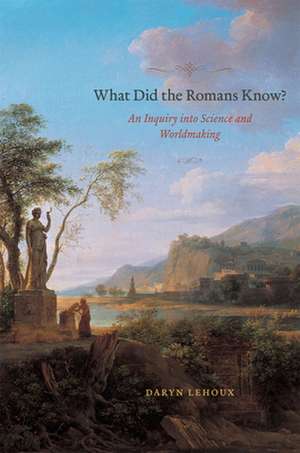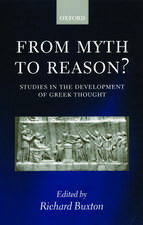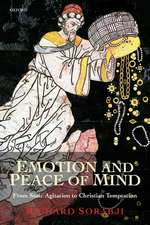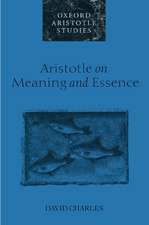What Did the Romans Know?: An Inquiry into Science and Worldmaking
Autor Daryn Lehouxen Limba Engleză Paperback – 7 apr 2014
What did the Romans know about their world? Quite a lot, as Daryn Lehoux makes clear in this fascinating and much-needed contribution to the history and philosophy of ancient science. Lehoux contends that even though many of the Romans’ views about the natural world have no place in modern science—the umbrella-footed monsters and dog-headed people that roamed the earth and the stars that foretold human destinies—their claims turn out not to be so radically different from our own.
Lehoux draws upon a wide range of sources from what is unquestionably the most prolific period of ancient science, from the first century BC to the second century AD. He begins with Cicero’s theologico-philosophical trilogy On the Nature of the Gods, On Divination, and On Fate, illustrating how Cicero’s engagement with nature is closely related to his concerns in politics, religion, and law. Lehoux then guides readers through highly technical works by Galen and Ptolemy, as well as the more philosophically oriented physics and cosmologies of Lucretius, Plutarch, and Seneca, all the while exploring the complex interrelationships between the objects of scientific inquiry and the norms, processes, and structures of that inquiry. This includes not only the tools and methods the Romans used to investigate nature, but also the Romans’ cultural, intellectual, political, and religious perspectives. Lehoux concludes by sketching a methodology that uses the historical material he has carefully explained to directly engage the philosophical questions of incommensurability, realism, and relativism.
By situating Roman arguments about the natural world in their larger philosophical, political, and rhetorical contexts, What Did the Romans Know? demonstrates that the Romans had sophisticated and novel approaches to nature, approaches that were empirically rigorous, philosophically rich, and epistemologically complex.
Preț: 253.06 lei
Nou
Puncte Express: 380
Preț estimativ în valută:
48.43€ • 50.03$ • 40.31£
48.43€ • 50.03$ • 40.31£
Carte tipărită la comandă
Livrare economică 25 martie-08 aprilie
Preluare comenzi: 021 569.72.76
Specificații
ISBN-13: 9780226143217
ISBN-10: 022614321X
Pagini: 288
Ilustrații: 5 halftones, 3 line drawings, 2 tables
Dimensiuni: 152 x 229 x 18 mm
Greutate: 0.4 kg
Editura: University of Chicago Press
Colecția University of Chicago Press
ISBN-10: 022614321X
Pagini: 288
Ilustrații: 5 halftones, 3 line drawings, 2 tables
Dimensiuni: 152 x 229 x 18 mm
Greutate: 0.4 kg
Editura: University of Chicago Press
Colecția University of Chicago Press
Notă biografică
Daryn Lehoux is professor of classics at Queen’s University in Kingston, Ontario. He is the author of Astronomy, Weather, and Calendars in the Ancient World.
Cuprins
Acknowledgments
1. The Web of Knowledge
A Roman World
A Roman World
Knowing Nature in the Roman Context
Overview
A Roman World
A Roman World
Knowing Nature in the Roman Context
Overview
2. Nature, Gods, and Governance
Divinity and Divination
Roman Virtues
Nature and the Legitimation of the Republic
A Ciceronian Contradiction?
Knowledge of Nature and Virtuous Action
Fabulae versus Learned Observation
Conclusion
3. Law in Nature, Nature in Law
Laws of Nature
Natural Laws
Human and Divine Governance
Is a “Law of Nature” Even Possible in Antiquity?
Divinity, Redux
Conclusion
4. Epistemology and Judicial Rhetoric
Theory-Ladenness and Observation
Observations as Models
Observational Selectivity
Examination of Witnesses
The Natural Authority of Morals
Declamation and Certainty
5. The Embeddedness of Seeing
Doubts about Vision
Mechanisms of Seeing in Antiquity
The Eyes as Organs
Not Every Black Box Is a Camera Obscura
Epistemologies of Seeing
The Centrality of Experience
6. The Trouble with Taxa
Knowledge Claims and Context-Dependence
Unproblematic Facticity
Problems with Experience
The Lab Section of the Chapter
The Question of Worlds
Epilogue
7. The Long Reach of Ontology
Four Kinds of Justification for Prediction
Predictability and Determinism
Physical Solutions to Determinism
The Cascading Effect
8. Dreams of a Final Theory
Explaining the Cosmos
Orbs, Souls, Laws
Numbers in Nature
Harmony and Empiricism
Conclusion
9. Of Miracles and Mistaken Theories
History as a Problem for Realism
Quantum Magnum PI?
Can We Avoid the Problems History Poses?
First Strategy: We Have Something They Didn’t
Second Strategy: The Curate’s Egg
Other Ways Out
10. Worlds Given, Worlds Made
What’s in a World?
Kuhn’s World
What Good Is Relativism?
Coherence
Truth and Meaning
Realism, Coherence, and History
11. Conclusion
Appendix: Lemma to the Mirror Problem
Reference List
Index
Recenzii
“No mere catalogue of accomplishments, [Lehoux’s] multifaceted book brilliantly rethinks both the Roman and our own approaches to the cosmos. . . . Between the coherent past world that the Romans made and the presumed timelessness of our scientific world, Lehoux leaves us not with an unbridgeable chasm but with his pragmatic realism, born at the confluence of ancient science, historical epistemology and the philosophy of science. First rate.”
“This is a thought-provoking book, and I think in its broad strokes it is successful; Lehoux demonstrates to my satisfaction both that all science is socially constructed to a degree and that we should take every society’s science seriously, because they certainly did. . . . It certainly gave me a new and profound respect for the world of Roman science, and for those who practiced it.”
“[A]n unprecedented and fascinating description of the mental experience of educated inhabitants of the Roman Empire looking at the natural world.”
“Elegant. . . . Lehoux’s persuasive narrative . . . is not only a work of classical scholarship: it is also a significant contribution to the philosophy of science.”
“In this important, brilliant, and truly admirable book, Lehoux has laid the groundwork for a deeper and clearer understanding of Roman science, most of all that it was rich and significant. May he continue to help us enter still further into what the Romans really knew and ponder what that should mean, in turn, for us.”
“This epistemologically sophisticated interrogation of Roman ‘scientific’ activities represents an exciting opportunity for a new beginning in the dialogue between philosophy of science and the history of scientific practices in the ancient world.”
“[A]n innovative and commendable exercise at the intersection of ancient history and the philosophy of science.”
“[C]omprehensive and thoughtful. . . . With a sound understanding of Roman natural philosophy and a touch of humor, Lehoux’s work investigates ideas fundamental to the history and philosophy of science.”
“This stimulating book richly repays study.”
“Recommended.”
“This book is a jewel.”
“This is a fascinating analysis of how elite Romans thought about their place in nature. It will be a permanent contribution to our attempts to understand how literate civilizations at various times and places have thought about human relationships to other creatures, to things, and to the gods.”
“What Did the Romans Know? is a brilliant achievement. Equally historical and philosophical, Lehoux’s book is simultaneously sophisticated and accessible. Virtually every page presents provocative and well-grounded insights that reshape what we thought we knew about the Romans and their interconnected world of nature, law, and religion. It is required reading for historians and philosophers, classicists, and anyone interested in antiquity and the bases of human knowledge about the natural world.”
“At the intersection of classics, history, and philosophy of science, this is a very original book that explores Roman ways of knowing the world and shows how, despite seeming irrational or completely alien to us today, those views of nature did make perfect sense. Engagingly written, replete with insights and flashes of humor, and addressing current debates in several disciplines, What Did the Romans Know? will finally put to rest the idea that ‘Roman science’ is a contradiction in terms.”



















